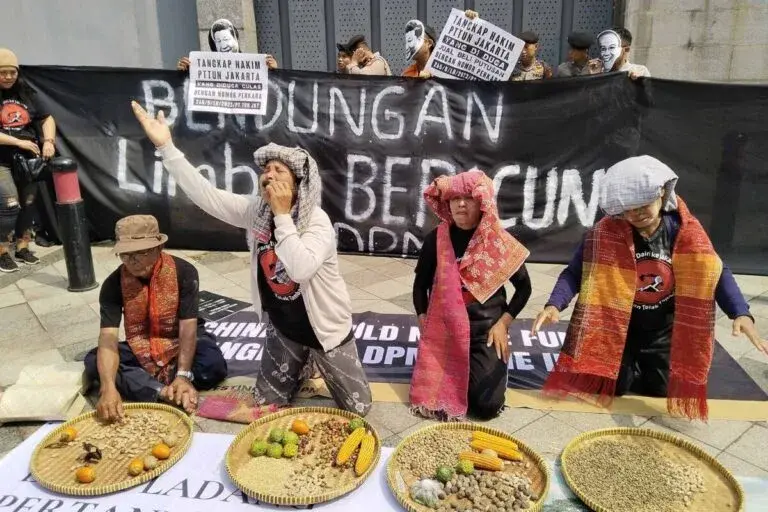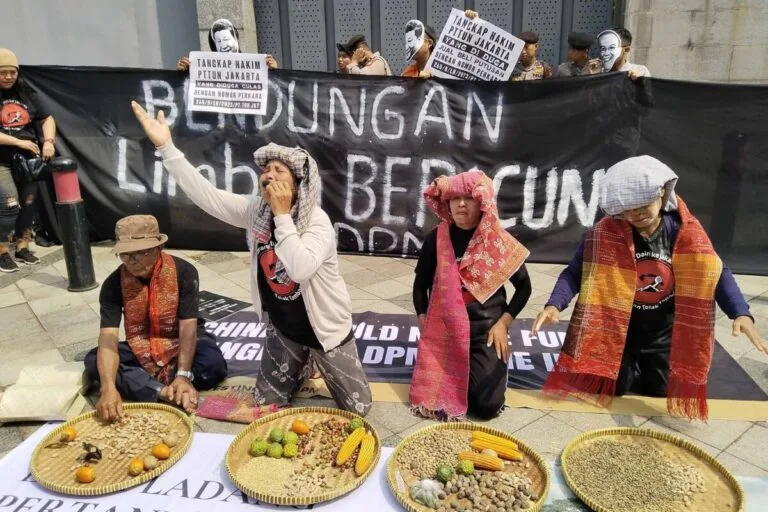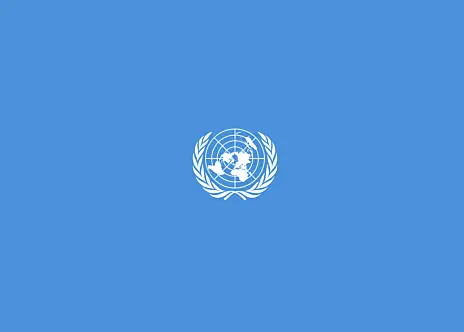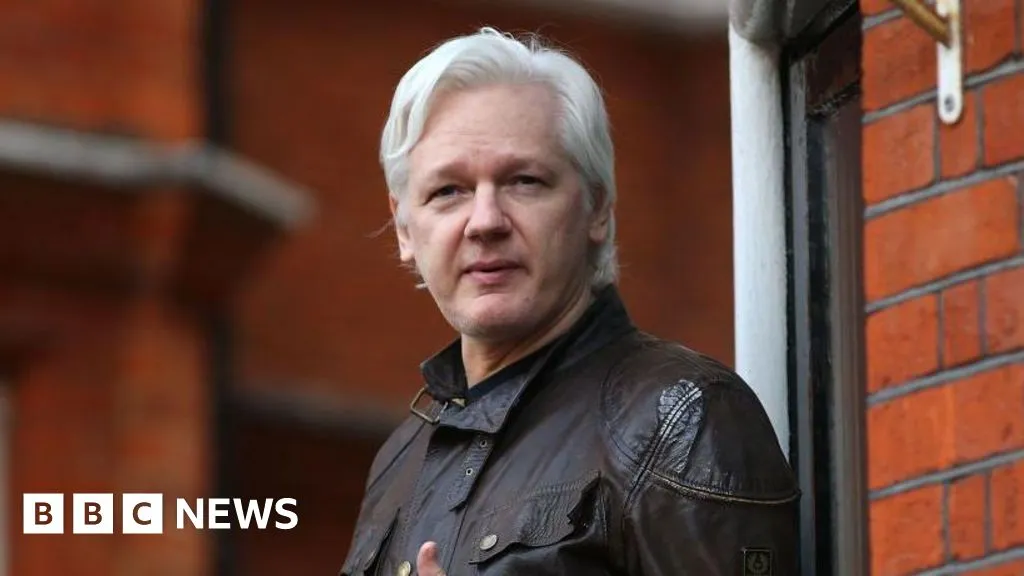JAKARTA — Protests are mounting in Indonesia against a China-backed zinc and lead mine being developed on the island of Sumatra in defiance of opposition from local communities. On June 11, protesters from communities that would be affected by the mine in Dairi district demonstrated outside the Chin...

- Communities in Indonesia’s Dairi district continue to protest a zinc and lead mine being developed by a Chinese-backed company.
- They warn the PT Dairi Prima Mineral (DPM) mine poses unacceptable risks to human life and the environment, given the potential for its waste dam to collapse in the earthquake-prone region.
- There are 11 villages located around or downstream of the proposed tailings dam, making the prospect of its collapse potentially disastrous. Some homes and houses of worship lie less than a kilometer (0.6 miles) from the dam, while an entire village of 2,010 people, called Pandiangan, is just 1.8 km (1.1 mi) from the dam.
- This would make the project illegal if it was built in China, since that country’s regulations prohibit the construction of a tailings dam within a kilometer of a populated area, according to Emerman.
- These concerns are borne out in a series of independent analyses of the project’s environmental impact assessment, which experts say fails to live up to the standards the developers claim to follow.
- Despite the questions over the assessment, the Indonesian government has issued environmental approval for the project, which local communities are now challenging at the Supreme Court.
"Unacceptable risks to human life and the environment": China-backed mine in Indonesia rings safety alarms over the potential for its waste dam to collapse in the earthquake-prone region
JAKARTA — Protests are mounting in Indonesia against a China-backed zinc and lead mine being developed on the island of Sumatra in defiance of opposition from local communities. On June 11, protesters from communities that would be affected by the mine in Dairi district demonstrated outside the Chin...

- Communities in Indonesia’s Dairi district continue to protest a zinc and lead mine being developed by a Chinese-backed company.
- They warn the PT Dairi Prima Mineral (DPM) mine poses unacceptable risks to human life and the environment, given the potential for its waste dam to collapse in the earthquake-prone region.
- There are 11 villages located around or downstream of the proposed tailings dam, making the prospect of its collapse potentially disastrous. Some homes and houses of worship lie less than a kilometer (0.6 miles) from the dam, while an entire village of 2,010 people, called Pandiangan, is just 1.8 km (1.1 mi) from the dam.
- This would make the project illegal if it was built in China, since that country’s regulations prohibit the construction of a tailings dam within a kilometer of a populated area, according to Emerman.
- These concerns are borne out in a series of independent analyses of the project’s environmental impact assessment, which experts say fails to live up to the standards the developers claim to follow.
- Despite the questions over the assessment, the Indonesian government has issued environmental approval for the project, which local communities are now challenging at the Supreme Court.

- The Chinese government’s rejection of recommendations to end its deepening human rights crisis reflects its disdain for international human rights reviews at the United Nations, human rights nongovernmental organizations said in a joint statement released on June 25, 2024.
- In a disingenuous effort to paper over its refusal to engage to improve its appalling record made clear by latest Universal Periodical Review (UPR) in January 2024, the Chinese government said it would accept 290 of the 428 recommendations, partially accept 8, note 32, and reject 98 of the recommendations made. The 290 accepted ones include those the government said it “accepted and being implemented” and those “accepted and already implemented.”
- However, none of the “accepted” recommendations address concerns raised by UN member states about crimes against humanity, torture, forced disappearance, persecution of human rights defenders and journalists, or other grave and well-documented violations.
- In this context, the numerous acceptances by the Chinese government does not mean actual intention to improve its rights record. No one should confuse a high number of accepted recommendations with any real commitment by Beijing on human rights.
- Beijing’s responses to UPR recommendations also include hostility towards the process and towards UN human rights mechanisms. The government has challenged the authority of the UPR to address topics Beijing insists are a matter of “sovereignty,” and disparaged the professionalism of UN human rights experts.
- The Chinese government also falsely proclaimed the August 2022 OHCHR report on human rights abuses in Xinjiang, which that office alleged may constitute crimes against humanity, as “completely illegal and void.”
- The Chinese government’s rejection of recommendations to end its deepening human rights crisis reflects its disdain for international human rights reviews at the United Nations, human rights nongovernmental organizations said in a joint statement released on June 25, 2024.
- In a disingenuous effort to paper over its refusal to engage to improve its appalling record made clear by latest Universal Periodical Review (UPR) in January 2024, the Chinese government said it would accept 290 of the 428 recommendations, partially accept 8, note 32, and reject 98 of the recommendations made. The 290 accepted ones include those the government said it “accepted and being implemented” and those “accepted and already implemented.”
- However, none of the “accepted” recommendations address concerns raised by UN member states about crimes against humanity, torture, forced disappearance, persecution of human rights defenders and journalists, or other grave and well-documented violations.
- In this context, the numerous acceptances by the Chinese government does not mean actual intention to improve its rights record. No one should confuse a high number of accepted recommendations with any real commitment by Beijing on human rights.
- Beijing’s responses to UPR recommendations also include hostility towards the process and towards UN human rights mechanisms. The government has challenged the authority of the UPR to address topics Beijing insists are a matter of “sovereignty,” and disparaged the professionalism of UN human rights experts.
- The Chinese government also falsely proclaimed the August 2022 OHCHR report on human rights abuses in Xinjiang, which that office alleged may constitute crimes against humanity, as “completely illegal and void.”
- The Chinese government’s rejection of recommendations to end its deepening human rights crisis reflects its disdain for international human rights reviews at the United Nations, human rights nongovernmental organizations said in a joint statement released on June 25, 2024.
- In a disingenuous effort to paper over its refusal to engage to improve its appalling record made clear by latest Universal Periodical Review (UPR) in January 2024, the Chinese government said it would accept 290 of the 428 recommendations, partially accept 8, note 32, and reject 98 of the recommendations made. The 290 accepted ones include those the government said it “accepted and being implemented” and those “accepted and already implemented.”
- However, none of the “accepted” recommendations address concerns raised by UN member states about crimes against humanity, torture, forced disappearance, persecution of human rights defenders and journalists, or other grave and well-documented violations.
- In this context, the numerous acceptances by the Chinese government does not mean actual intention to improve its rights record. No one should confuse a high number of accepted recommendations with any real commitment by Beijing on human rights.
- Beijing’s responses to UPR recommendations also include hostility towards the process and towards UN human rights mechanisms. The government has challenged the authority of the UPR to address topics Beijing insists are a matter of “sovereignty,” and disparaged the professionalism of UN human rights experts.
- The Chinese government also falsely proclaimed the August 2022 OHCHR report on human rights abuses in Xinjiang, which that office alleged may constitute crimes against humanity, as “completely illegal and void.”
Reports surface days before UN summit on Afghanistan that will exclude Afghan women and debate on women’s rights

Reports surface days before UN summit on Afghanistan that will exclude Afghan women and debate on women’s rights
-
In more than one case the arrests and sexual abuse that young women faced while in custody earlier this year led to suicide and attempted suicide.
-
In one case, a woman’s body was allegedly found in a canal a few weeks after she had been taken into custody by Taliban militants, with a source close to her family saying she had been sexually abused before her death.
-
Girls and women also say they had been subjected to beatings and intimidation while in detention.
> Amina*, a 22-year-old medical student, said she spent three nights in a Taliban prison after being arrested in January 2024. She said she was interrogated by an older man who asked her about her menstruation and whether she was married or not.
> “I fell at his feet and begged him, ‘Please, kill me but don’t harass me’,” she said. “He said: ‘Since you are keen to die, I will kill you, but before that, let us have fun with you.’
> “Then he started touching my private parts,” Amina said. “I fainted twice during the interrogation, but every time, he poured cold water over my head.”
> Amina said what happened to her happened to every girl taken to that interrogation room and left alone with the man.
Reports surface days before UN summit on Afghanistan that will exclude Afghan women and debate on women’s rights

Reports surface days before UN summit on Afghanistan that will exclude Afghan women and debate on women’s rights
-
In more than one case the arrests and sexual abuse that young women faced while in custody earlier this year led to suicide and attempted suicide.
-
In one case, a woman’s body was allegedly found in a canal a few weeks after she had been taken into custody by Taliban militants, with a source close to her family saying she had been sexually abused before her death.
-
Girls and women also say they had been subjected to beatings and intimidation while in detention.
> Amina*, a 22-year-old medical student, said she spent three nights in a Taliban prison after being arrested in January 2024. She said she was interrogated by an older man who asked her about her menstruation and whether she was married or not.
> “I fell at his feet and begged him, ‘Please, kill me but don’t harass me’,” she said. “He said: ‘Since you are keen to die, I will kill you, but before that, let us have fun with you.’
> “Then he started touching my private parts,” Amina said. “I fainted twice during the interrogation, but every time, he poured cold water over my head.”
> Amina said what happened to her happened to every girl taken to that interrogation room and left alone with the man.
Reports surface days before UN summit on Afghanistan that will exclude Afghan women and debate on women’s rights

Reports surface days before UN summit on Afghanistan that will exclude Afghan women and debate on women’s rights
-
In more than one case the arrests and sexual abuse that young women faced while in custody earlier this year led to suicide and attempted suicide.
-
In one case, a woman’s body was allegedly found in a canal a few weeks after she had been taken into custody by Taliban militants, with a source close to her family saying she had been sexually abused before her death.
-
Girls and women also say they had been subjected to beatings and intimidation while in detention.
> Amina*, a 22-year-old medical student, said she spent three nights in a Taliban prison after being arrested in January 2024. She said she was interrogated by an older man who asked her about her menstruation and whether she was married or not.
> “I fell at his feet and begged him, ‘Please, kill me but don’t harass me’,” she said. “He said: ‘Since you are keen to die, I will kill you, but before that, let us have fun with you.’
> “Then he started touching my private parts,” Amina said. “I fainted twice during the interrogation, but every time, he poured cold water over my head.”
> Amina said what happened to her happened to every girl taken to that interrogation room and left alone with the man.
Chinese hackers target government agencies worldwide with SugarGh0st and SpiceRAT malware.

-
A previously undocumented Chinese-speaking threat actor codenamed SneakyChef has been linked to an espionage campaign primarily targeting government entities across Asia and EMEA (Europe, Middle East, and Africa) with SugarGh0st malware since at least August 2023.
-
SneakyChef uses lures that are scanned documents of government agencies, most of which are related to various countries' Ministries of Foreign Affairs or embassies, according to security analysts.
Chinese hackers target government agencies worldwide with SugarGh0st and SpiceRAT malware.

-
A previously undocumented Chinese-speaking threat actor codenamed SneakyChef has been linked to an espionage campaign primarily targeting government entities across Asia and EMEA (Europe, Middle East, and Africa) with SugarGh0st malware since at least August 2023.
-
SneakyChef uses lures that are scanned documents of government agencies, most of which are related to various countries' Ministries of Foreign Affairs or embassies, according to security analysts.
Chinese hackers target government agencies worldwide with SugarGh0st and SpiceRAT malware.

-
A previously undocumented Chinese-speaking threat actor codenamed SneakyChef has been linked to an espionage campaign primarily targeting government entities across Asia and EMEA (Europe, Middle East, and Africa) with SugarGh0st malware since at least August 2023.
-
SneakyChef uses lures that are scanned documents of government agencies, most of which are related to various countries' Ministries of Foreign Affairs or embassies, according to security analysts.
Yeah, sure clean all yards but start with your own.
Do you say that to Europe, to China, or both?
It's obvious you're addressing only Europe. Why?
This is what I meant with 'The West bad, China bad okay'. It's hypocritical. It's double-standards. It's ignorant and disgusting.
What about cleaning all yards? This 'the West bad, China bad okay' stance is dehumanising and ignorant. [Edit typo.]
Ja, und Fakt ist nunmal, dass China von der Krise in Griechenland profitiert und den Hafen von Piräus übernommen hat, nicht Deutschland, wie von Dir irrtümlich gepostet.
I posted this elsewhere already, but it also fits here goven many of the posts in this thread: It is not just about data/privacy concerns (which are underestimated imo, as China pursues an own agenda with collecting your data through Chinese tech) and 'unfair' subsidies, but about gross human rights violations.
In short, some parts of the cheap Chinese cars are made in concentration camps where people are forced to work under catastrophic conditions.
I posted this elsewhere already, but it also fits here goven many of the posts in this thread: It is not just about data/privacy concerns (which are underestimated imo, as China pursues an own agenda with collecting your data through Chinese tech) and 'unfair' subsidies, but about gross human rights violations.
In short, some parts of the cheap Chinese cars are made in concentration camps where people are forced to work under catastrophic conditions.
It is not just about data/privacy concerns (which are underestimated imo, as China pursues an own agenda with collecting your data through Chinese tech) and 'unfair' subsidies, but about gross human rights violations. In short, the cheap Chinese cars are made in concentration camps where people are forced to work under catastrophic conditions.
The EU Council approved a ban on June 24 on access within the bloc to four key Russian state-run or controlled media outlets effective the next day (June 25):
- Rossiyskaya Gazeta
- Voice of Europe
- RIA Novosti
- Izvestiya.
The EU already banned other Russian propaganda outlets before, such as RT and Sputnik.
Bitte gerne. Bei all der Propaganda ist es nicht immer einfach, den Überblick zu behalten, selbst bei einfachen Fakten. Da sind dann oft kleine Sachen wichtig. Schrittchen für Schrittchen sozusagen.
Here is the official statement (pdf)
EU Council adds six Russians to sanctions list over alleged hacking activities:
- Ruslan Aleksandrovich PERETYATKO: attributed to Callisto Group (Seaborgium, Star Blizzard COLDRIVER)
- Andrey Stanislavovich KORINETS: attributed to e Federal SecurityService (FSB) Center 18, and Callisto Group.
- Oleksandr SKLIANKO: attributed to Armageddon hacking group supported by FSB
- Mykola CHERNYKH: attributed to Armageddon hacking group supported by FSB
- Mikhail Mikhailovich TSAREV: attributed to threat group Wizard Spider, responsible for Conti and Trickbot malware
- Maksim Sergeevich GALOCHKIN: attributed to threat group Wizard Spider, responsible for Conti and Trickbot malware
The EU horizontal cyber sanctions regime currently applies to 14 individuals and four entities, and includes an asset freeze and a travel ban. Additionally, EU persons and entities are forbidden from making funds available to those listed.
Russia's exiled chief Rabbi Pinchas Goldschmidt was speaking after gunmen killed 19 people in the mainly Muslim region of Dagestan in southern Russia in attacks on churches, synagogues and the police.
"The Russian authorities during the last years have used the law enforcement authorities to repress any kind of opposition to the Kremlin, opposition to the war and any movements like the LGBT movement which was declared as extremist. People are sent to prison for criticising the war," Goldschmidt said in a video interview from Berlin.
"So instead of using law enforcement and the interior ministry and FSB (security service) to provide security for Russian citizens, it's being used to eradicate any opposition to the regime. And here we see the results, that such terrorists like ISIS are able to again and again mount successful attacks against houses of worship, against cultural events." [...]
Putin offers condolences
The Kremlin said President Vladimir Putin expressed his deep condolences over Sunday's attacks, but it has not commented on who was to blame or why authorities failed to stop them.
[...]
Goldschmidt himself left Russia soon after the start of the war and has encouraged more Jews to follow his example rather than stay on in what he called a "semi-totalitarian" country.
"Tens of thousands of Jews left, and I'm happy they left," he said. "We are worried for all of those who are still there."
Russia's exiled chief Rabbi Pinchas Goldschmidt was speaking after gunmen killed 19 people in the mainly Muslim region of Dagestan in southern Russia in attacks on churches, synagogues and the police.
"The Russian authorities during the last years have used the law enforcement authorities to repress any kind of opposition to the Kremlin, opposition to the war and any movements like the LGBT movement which was declared as extremist. People are sent to prison for criticising the war," Goldschmidt said in a video interview from Berlin.
"So instead of using law enforcement and the interior ministry and FSB (security service) to provide security for Russian citizens, it's being used to eradicate any opposition to the regime. And here we see the results, that such terrorists like ISIS are able to again and again mount successful attacks against houses of worship, against cultural events." [...]
Putin offers condolences
The Kremlin said President Vladimir Putin expressed his deep condolences over Sunday's attacks, but it has not commented on who was to blame or why authorities failed to stop them.
[...]
Goldschmidt himself left Russia soon after the start of the war and has encouraged more Jews to follow his example rather than stay on in what he called a "semi-totalitarian" country.
"Tens of thousands of Jews left, and I'm happy they left," he said. "We are worried for all of those who are still there."
Russia's exiled chief Rabbi Pinchas Goldschmidt was speaking after gunmen killed 19 people in the mainly Muslim region of Dagestan in southern Russia in attacks on churches, synagogues and the police.
"The Russian authorities during the last years have used the law enforcement authorities to repress any kind of opposition to the Kremlin, opposition to the war and any movements like the LGBT movement which was declared as extremist. People are sent to prison for criticising the war," Goldschmidt said in a video interview from Berlin.
"So instead of using law enforcement and the interior ministry and FSB (security service) to provide security for Russian citizens, it's being used to eradicate any opposition to the regime. And here we see the results, that such terrorists like ISIS are able to again and again mount successful attacks against houses of worship, against cultural events." [...]
Putin offers condolences
The Kremlin said President Vladimir Putin expressed his deep condolences over Sunday's attacks, but it has not commented on who was to blame or why authorities failed to stop them.
[...]
Goldschmidt himself left Russia soon after the start of the war and has encouraged more Jews to follow his example rather than stay on in what he called a "semi-totalitarian" country.
"Tens of thousands of Jews left, and I'm happy they left," he said. "We are worried for all of those who are still there."
Russia's exiled chief Rabbi Pinchas Goldschmidt was speaking after gunmen killed 19 people in the mainly Muslim region of Dagestan in southern Russia in attacks on churches, synagogues and the police.
"The Russian authorities during the last years have used the law enforcement authorities to repress any kind of opposition to the Kremlin, opposition to the war and any movements like the LGBT movement which was declared as extremist. People are sent to prison for criticising the war," Goldschmidt said in a video interview from Berlin.
"So instead of using law enforcement and the interior ministry and FSB (security service) to provide security for Russian citizens, it's being used to eradicate any opposition to the regime. And here we see the results, that such terrorists like ISIS are able to again and again mount successful attacks against houses of worship, against cultural events." [...]
Putin offers condolences
The Kremlin said President Vladimir Putin expressed his deep condolences over Sunday's attacks, but it has not commented on who was to blame or why authorities failed to stop them.
[...]
Goldschmidt himself left Russia soon after the start of the war and has encouraged more Jews to follow his example rather than stay on in what he called a "semi-totalitarian" country.
"Tens of thousands of Jews left, and I'm happy they left," he said. "We are worried for all of those who are still there."
The Russian division of the Bank of China has suspended operations with Russian lenders sanctioned by the United States in order to avoid being hit with secondary sanctions, the Kommersant business newspaper reported Monday, citing industry insiders.

The Russian division of the Bank of China has suspended operations with Russian lenders sanctioned by the United States in order to avoid being hit with secondary sanctions, the Kommersant business newspaper reported Monday, citing industry insiders.
The Bank of China’s Russian division — which specializes in yuan payments between Russia and China — is the second-largest Chinese banking subsidiary in the country [...]
Experts [said that this] would likely increase fraud risks given the subsequent shift to opaque intermediaries to process payments between Russian and Chinese entities.
“This is not very good news for the Russian market,” an anonymous industry insider was quoted [...]. “There will be additional costs both in time and the price of processing payments.”
"But the most important problem is that payments go beyond the banking sector, resulting in the state having less control,” the source added.
The Russian division of the Bank of China has suspended operations with Russian lenders sanctioned by the United States in order to avoid being hit with secondary sanctions, the Kommersant business newspaper reported Monday, citing industry insiders.

The Russian division of the Bank of China has suspended operations with Russian lenders sanctioned by the United States in order to avoid being hit with secondary sanctions, the Kommersant business newspaper reported Monday, citing industry insiders.
The Bank of China’s Russian division — which specializes in yuan payments between Russia and China — is the second-largest Chinese banking subsidiary in the country [...]
Experts [said that this] would likely increase fraud risks given the subsequent shift to opaque intermediaries to process payments between Russian and Chinese entities.
“This is not very good news for the Russian market,” an anonymous industry insider was quoted [...]. “There will be additional costs both in time and the price of processing payments.”
"But the most important problem is that payments go beyond the banking sector, resulting in the state having less control,” the source added.
The Russian division of the Bank of China has suspended operations with Russian lenders sanctioned by the United States in order to avoid being hit with secondary sanctions, the Kommersant business newspaper reported Monday, citing industry insiders.

The Russian division of the Bank of China has suspended operations with Russian lenders sanctioned by the United States in order to avoid being hit with secondary sanctions, the Kommersant business newspaper reported Monday, citing industry insiders.
The Bank of China’s Russian division — which specializes in yuan payments between Russia and China — is the second-largest Chinese banking subsidiary in the country [...]
Experts [said that this] would likely increase fraud risks given the subsequent shift to opaque intermediaries to process payments between Russian and Chinese entities.
“This is not very good news for the Russian market,” an anonymous industry insider was quoted [...]. “There will be additional costs both in time and the price of processing payments.”
"But the most important problem is that payments go beyond the banking sector, resulting in the state having less control,” the source added.
Wikileaks said its founder had left a UK prison after striking a deal to plead guilty to US criminal charges.

After a years-long legal saga, Wikileaks says that founder Julian Assange has left the UK after reaching a deal with US authorities that will see him plead guilty to criminal charges and go free.
Assange, 52, was charged with conspiracy to obtain and disclose national defence information [...]
Assange will spend no time in US custody and will receive credit for the time spent incarcerated in the UK.
[He] will return to Australia, according to a letter from the justice department.
Done.
@hsdkfr734r Der Hafen von Piräus, der bedeutendste und grösste griechische Hafen, gehört jetzt China, nur um ein Beispiel zu nennen. Denn er ist nicht der einzige.
nachvollziehbaren Informationen.
Ja, genau. Deshalb braucht es u.a. auch unabhängige Audits. Dann wäre alles nachvollziehbar.
Das ist nicht nur eine Frage des Zolls. Viele Produkte -in der Auto- ebenso wie in praktisch allen anderen Industrien- werden in Zwangsarbeit hergestellt, und zwar auch, aber nicht nur in Xinjiang. Solange China keine unabhängigen Audits seiner Lieferketten zulässt (was u.a. VW kürzlich offen gesagt hat), sollte sich die Frage nach Zöllen gar nicht erst stellen. Produkte, die unter solchen menschenverachtenden Bedingungen produziert werden, sollte es gar nicht geben. Europa braucht u.a. auch ein viel strengeres Lieferkettengesetz.
Zudem gefährdet China durch seine Unterstützung Russlands im Ukraine-Krieg und sein aggressives Verhalten im Südchinesischen Meer die internationale Sicherheit (auch das wird in letzter Zeit wiederholt angeprangert, mittlerweile sogar von Politikern in Europa).
Naja, streng genommen nicht. Ein Kommentar soll 'nur' alle Seiten eines Themas beleuchten, aber nicht die Meinung derer, die das schreiben. Die Meinung der Journalisten und -innen sollte belanglos sein. Daran hält sich nur (fast) niemand in der Branche.
Naja, das hängt wohl von der Meinung ab. Wenn es um konservative Meinungen geht, dann sind die öffentlich-rechtlichen vorne dabei: https://www.tagesschau.de/kommentar/chatkontrolle-eu-102.html
This isn't an Italian problem, there are bad people everywhere. In Italy it's not better nor worse, so there's no reason to pidgeonhole a nation.
Die ARD wird halt immer mehr zu dem, was die Programmdirektorin draus macht?
It's a bot with a funny human touch 😅
And one detail here is that mainstream media don't report on this. They do as if it didn't happen.